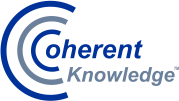)Team
Coherent’s world-class team has unrivaled expertise in developing logic systems and associated standards. The team has taken the technology from fundamental research and invention to commercialization today. With a history of industry leadership, it has extensive experience applying logic systems to numerous domains in government and business.
Past industry-leading logic systems and standards created by team members include: XSB Prolog, RuleML, SWRL, W3C RIF & OWL-RL, IBM Agent Building Environment, IBM Common Rules, Flora-2, SweetRules, and SILK.
Benjamin Grosof, Ph.D.
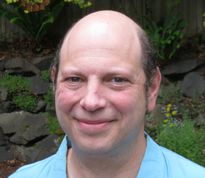 Benjamin Grosof (Co-founder) is an industry leader in knowledge representation, reasoning, and acquisition. He has pioneered semantic technology and industry standards for rules combined with ontologies, their acquisition from natural language (NL), and their applications in finance, e-commerce, policies (including contracts, regulations, and security), and e-learning. He co-founded the influential standards design body RuleML and has had driving roles in W3C RIF (Rule Interchange Format) and W3C OWL-RL (rule-based ontologies). He led the invention of several fundamental technical advances in knowledge representation including Rulelog (a major research breakthrough in logic-based artificial intelligence combined with natural language processing), courteous defeasibility (exception-case rules), restraint bounded rationality (scalability in complex reasoning), and rule-based description-logic ontologies. He has extensive experience in user interaction design, and in combining logical methods with machine learning and probabilistic uncertainty.
Benjamin Grosof (Co-founder) is an industry leader in knowledge representation, reasoning, and acquisition. He has pioneered semantic technology and industry standards for rules combined with ontologies, their acquisition from natural language (NL), and their applications in finance, e-commerce, policies (including contracts, regulations, and security), and e-learning. He co-founded the influential standards design body RuleML and has had driving roles in W3C RIF (Rule Interchange Format) and W3C OWL-RL (rule-based ontologies). He led the invention of several fundamental technical advances in knowledge representation including Rulelog (a major research breakthrough in logic-based artificial intelligence combined with natural language processing), courteous defeasibility (exception-case rules), restraint bounded rationality (scalability in complex reasoning), and rule-based description-logic ontologies. He has extensive experience in user interaction design, and in combining logical methods with machine learning and probabilistic uncertainty.
Dr. Grosof has experience applying core technology for knowledge, reasoning, and related human-computer interaction (HCI) in a wide variety of applications for data/decision analytics, including: defense and national intelligence; financial services, insurance, and risk management; regulatory compliance; information integration; policies, contracts, and legal; e-commerce, digital marketing, and customer care; privacy/security and trust management; health care and life science; education and publishing.
Dr. Grosof was the founding CTO and CEO of Coherent (2013-2017), and later Chief Scientist of Coherent (2020-2023). Since September 2023, he is a Program Manager at the Defense Advanced Research Projects Agency (DARPA) in its Defense Sciences Office. During 2018-2020, he was Chief Scientist (a CXO position) at Kyndi, a venture-backed Silicon Valley AI startup focused on semantic search. During 2017-2018, he was a technical executive for the launch o an ambitious initiative to leverage AI for business process automation across Accenture’s $7.5B+ Operations group. He led a large research program in advanced Artificial Intelligence (AI) and rule-based semantic technologies at Vulcan Inc. for Paul G. Allen (2007-2013). He was an IT professor and DARPA PI at MIT Sloan (2000-2007), a senior software scientist at IBM Research (1988-2000) and principal of his own part-time expert consulting firm (2000-2017). His background includes 5 major industry software releases, 2 years in other previous software startups, a Stanford PhD (Computer Science), a Harvard BA (Applied Mathematics), 8+ patents, and 70+ refereed publications. For more info, see his LinkedIn and his home page.
Michael Kifer, Ph.D.
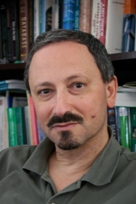 Michael Kifer (CTO, co-founder) is a Professor with the Department of Computer Science, Stony Brook University, USA. He received his Ph.D. in Computer Science in 1984 from the Hebrew University of Jerusalem, Israel, and the M.S. degree in Mathematics in 1976 from Moscow State University, Russia.
Michael Kifer (CTO, co-founder) is a Professor with the Department of Computer Science, Stony Brook University, USA. He received his Ph.D. in Computer Science in 1984 from the Hebrew University of Jerusalem, Israel, and the M.S. degree in Mathematics in 1976 from Moscow State University, Russia.
Since 2012, Dr. Kifer has been the President of the Rules and Reasoning Association (RRA). His work spans the areas of knowledge representation, logic programming, Web information systems, and databases. He has published four text books and numerous articles in these areas. He co-invented F-logic, HiLog, Annotated Logic, and Transaction Logic, which are among the most widely cited works in Computer Science and Semantic Web research, in particular. Twice, in 1999 and 2002, he was a recipient of the prestigious ACM-SIGMOD “Test of Time” awards for his works on F-logic and object-oriented database languages. In 2006, he was a Plumer Fellow at Oxford University’s St. Anne’s College and in 2008 he received SUNY Chancellor’s Award for Excellence in Scholarship. In 2013, Dr. Kifer received another prestigious award: The 20-year “Test of Time” award from the Association for Logic Programming (ALP) for his work on Transaction Logic.
Theresa (Teri) Swift, Ph.D.
 Dr. Theresa Swift (Principal Engineer, co-founder) has over 25 years of experience in research in computational logic and in the design and development of major computer systems. As a researcher she has over 75 publications in major refereed journals and conferences and is editor of three books. Topics of these publications include the implementation of high-performance logic systems; non-monotonic reasoning and reasoning under uncertainty; knowledge representation; parallel, multi-threaded and distributed programming; verification of concurrent systems; theorem proving; the semantic web; medical informatics decision and workflow systems, deductive databases; data standardization and data quality enforcement. She has served on dozens of international program committees in these areas, as well as serving as general and program chairs. Dr. Swift has successfully advised two PhD dissertations, and served on over a dozen PhD committees. She has received funding from agencies such as NSF (including an NSF career award); DARPA and NIH. Her current academic affiliation is with CENTRIA, Universidade Nova de Lisboa.
Dr. Theresa Swift (Principal Engineer, co-founder) has over 25 years of experience in research in computational logic and in the design and development of major computer systems. As a researcher she has over 75 publications in major refereed journals and conferences and is editor of three books. Topics of these publications include the implementation of high-performance logic systems; non-monotonic reasoning and reasoning under uncertainty; knowledge representation; parallel, multi-threaded and distributed programming; verification of concurrent systems; theorem proving; the semantic web; medical informatics decision and workflow systems, deductive databases; data standardization and data quality enforcement. She has served on dozens of international program committees in these areas, as well as serving as general and program chairs. Dr. Swift has successfully advised two PhD dissertations, and served on over a dozen PhD committees. She has received funding from agencies such as NSF (including an NSF career award); DARPA and NIH. Her current academic affiliation is with CENTRIA, Universidade Nova de Lisboa.
Dr. Swift has led the development of the XSB Programming system, a major open-source Prolog. XSB supports various ISO standards for Prologs, and includes such features as constraints, tabling for non-monotonic reasoning, multi-threading, ontology management and integration with ASP. XSB is widely used for both commercial and research applications: there have been over 40,000 downloads of XSB, and it is a major tool of the company XSB, Inc., as well as other companies.
Note: Theresa (Teri) Swift was formerly known as Terrance (Terry) Swift.
Janine Bloomfield, Ph.D.
Dr. Janine Bloomfield (COO, co-founder) has experience in knowledge engineering; marketing, writing, and website development, for research and non-research audiences; 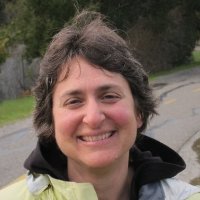 small-business administration; education, including teaching and curriculum development; data analysis and statistics; and scientific research in life sciences. She is a mindfulness educator for students, teachers, and parents. Previously in her career, she was a senior scientist, on global climate change, at Environmental Defense Fund, one of the most influential USA environmental non-profits. There, she did science communications at national and international level, including: national media; state and federal policy advising; and science curriculum development. She authored a series of influential white papers, op-eds, and web material. Before that, she was a researcher on acid rain at US Forest Service. She received a MS in biology from Stanford University, and a PhD in ecosystem ecology from Yale University.
small-business administration; education, including teaching and curriculum development; data analysis and statistics; and scientific research in life sciences. She is a mindfulness educator for students, teachers, and parents. Previously in her career, she was a senior scientist, on global climate change, at Environmental Defense Fund, one of the most influential USA environmental non-profits. There, she did science communications at national and international level, including: national media; state and federal policy advising; and science curriculum development. She authored a series of influential white papers, op-eds, and web material. Before that, she was a researcher on acid rain at US Forest Service. She received a MS in biology from Stanford University, and a PhD in ecosystem ecology from Yale University.
Paul Fodor, Ph.D.
Dr. Paul Fodor (Senior Engineer, co-founder) is a Research Assistant Professor in the Computer Science Department at Stony Brook University. 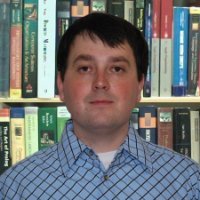 His work on declarative rule languages and logic used as a specification language and implementation framework for knowledge bases was applied in areas ranging from natural language processing to complex event processing and semantic Web technologies. Through his research, Dr. Fodor has contributed to several large software projects: the IBM Watson natural language processing system for the Jeopardy! challenge against human champions, the OpenRuleBench suite of benchmarks for analyzing the performance and scalability of rule systems for the semantic web, the ETALIS declarative complex event processing and stream reasoning system, and the SILK system (Semantic Inferencing on Large Knowledge) for highly expressive yet scalable semantic rules. Dr. Fodor received a B.S. degree in computer science from the Technical University of Cluj-Napoca in 2002, and M.S. and Ph.D. degrees in computer science from the Stony Brook University in 2006 and 2011, respectively.
His work on declarative rule languages and logic used as a specification language and implementation framework for knowledge bases was applied in areas ranging from natural language processing to complex event processing and semantic Web technologies. Through his research, Dr. Fodor has contributed to several large software projects: the IBM Watson natural language processing system for the Jeopardy! challenge against human champions, the OpenRuleBench suite of benchmarks for analyzing the performance and scalability of rule systems for the semantic web, the ETALIS declarative complex event processing and stream reasoning system, and the SILK system (Semantic Inferencing on Large Knowledge) for highly expressive yet scalable semantic rules. Dr. Fodor received a B.S. degree in computer science from the Technical University of Cluj-Napoca in 2002, and M.S. and Ph.D. degrees in computer science from the Stony Brook University in 2006 and 2011, respectively.
